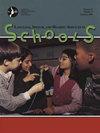Using a Refutation Text to Improve School-Based Speech-Language Pathologists' Knowledge of Dyslexia.
IF 2.9
3区 医学
Q1 AUDIOLOGY & SPEECH-LANGUAGE PATHOLOGY
Language Speech and Hearing Services in Schools
Pub Date : 2025-09-09
DOI:10.1044/2025_lshss-24-00133
引用次数: 0
Abstract
PURPOSE Misconceptions about dyslexia abound among the public and educators alike. Refutation texts have been used to change misconceptions about a variety of topics, mostly in science education. The purpose of this study was to determine whether reading a refutation text about dyslexia could improve knowledge of dyslexia among school-based speech-language pathologists (SLPs). METHOD Participants were school-based SLPs (n = 37). They completed a pretest of knowledge of dyslexia, were randomly assigned to read a refutation text or comparison text about dyslexia, and then completed a posttest of knowledge of dyslexia. They completed a maintenance test of knowledge of dyslexia approximately 4 weeks after completing the posttest. Data were analyzed using a two-way mixed analysis of variance with follow-up t tests. RESULTS There were statistically significant main effects of testing time (pretest, posttest, maintenance) and group (refutation text, comparison test). There was also a statistically significant time-by-group interaction. The refutation text group demonstrated more accurate knowledge of dyslexia than the comparison group at the posttest time point and at the maintenance time point. Additionally, the refutation text group demonstrated less forgetting between the posttest and maintenance time points than the comparison text group. CONCLUSION The refutation text was more effective than the comparison text for improving school SLPs' knowledge of dyslexia.运用反驳文本提高校本语言病理学家对阅读障碍的认识。
目的在公众和教育工作者中,关于阅读障碍的概念比比皆是。反驳文本被用来改变对各种主题的误解,主要是在科学教育中。本研究的目的是确定阅读一篇关于阅读障碍的反驳文章是否可以提高学校语言病理学家对阅读障碍的认识。方法以学校为基础的slp为研究对象(n = 37)。他们完成了阅读障碍知识的前测,被随机分配阅读关于阅读障碍的反驳文本或比较文本,然后完成阅读障碍知识的后测。他们在完成后测大约4周后完成了对阅读障碍知识的维持测试。数据分析采用双向混合方差分析和随访t检验。结果测试时间(前测、后测、维持)和分组(反驳文本、比较检验)的主效应均有统计学意义。分组时间的相互作用也有统计学意义。在测试后时间点和维持时间点,反驳文本组对阅读障碍的认知比对照组更准确。此外,反驳文本组在测试后和维持时间点之间的遗忘程度低于比较文本组。结论反驳文本比对照文本更能提高小学生阅读障碍知识水平。
本文章由计算机程序翻译,如有差异,请以英文原文为准。
求助全文
约1分钟内获得全文
求助全文
来源期刊

Language Speech and Hearing Services in Schools
Social Sciences-Linguistics and Language
CiteScore
4.40
自引率
12.50%
发文量
165
期刊介绍:
Mission: LSHSS publishes peer-reviewed research and other scholarly articles pertaining to the practice of audiology and speech-language pathology in the schools, focusing on children and adolescents. The journal is an international outlet for clinical research and is designed to promote development and analysis of approaches concerning the delivery of services to the school-aged population. LSHSS seeks to advance evidence-based practice by disseminating the results of new studies as well as providing a forum for critical reviews and meta-analyses of previously published work.
Scope: The broad field of audiology and speech-language pathology as practiced in schools, including aural rehabilitation; augmentative and alternative communication; childhood apraxia of speech; classroom acoustics; cognitive impairment; craniofacial disorders; fluency disorders; hearing-assistive technology; language disorders; literacy disorders including reading, writing, and spelling; motor speech disorders; speech sound disorders; swallowing, dysphagia, and feeding disorders; voice disorders.
 求助内容:
求助内容: 应助结果提醒方式:
应助结果提醒方式:


